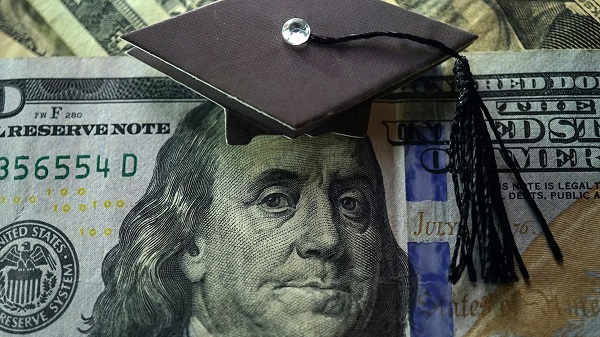
Student loans are difficult, but not impossible, to discharge in bankruptcy. To do so, you must show that payment of the debt “will impose an undue hardship on you and your dependents.”
Courts use different tests to evaluate whether a particular borrower has shown an undue hardship.
The most common test is the Brunner test which requires a showing that 1) the debtor cannot maintain, based on current income and expenses, a “minimal” standard of living for the debtor and the debtor’s dependents if forced to repay the student loans; 2) additional circumstances exist indicating that this state of affairs is likely to persist for a significant portion of the repayment period of the student loans; and 3) the debtor has made good faith efforts to repay the loans. (Brunner v. New York State Higher Educ. Servs. Corp., 831 F. 2d 395 (2d Cir. 1987). Most, but not all, courts use this test. A lot has changed since this 1987 court decision and some courts have begun to question whether they should use a different standard. For now, most federal courts of appeal have adopted the Brunner test, but the law in this area is changing.
If you can successfully prove undue hardship, your student loan will be completely canceled. Filing for bankruptcy also automatically protects you from collection actions on all of your debts, at least until the bankruptcy case is resolved or until the creditor gets permission from the court to start collecting again.
Assuming you can discharge your student loan debt by proving hardship, bankruptcy may be a good option for you. It is a good idea to first consult with a lawyer or other professional to understand other pros and cons associated with bankruptcy. For example, a bankruptcy can remain part of your credit history for ten years. There are costs associated with filing for bankruptcy as well as a number of procedural hurdles. There are also limits on how often you can file for bankruptcy.
How to Discharge Student Loans in Bankruptcy
Whether a student loan is discharged based on hardship is not automatically determined in the bankruptcy process. You must file a petition (called an adversary proceeding) to get a determination.
If you already filed for bankruptcy, but did not request a determination of undue hardship, you may reopen your bankruptcy case at any time in order to file this proceeding. You should be able to do this without payment of an additional filing fee. Chapter 11 of NCLC’s Student Loan Law publication includes extensive information about discharging student loans in bankruptcy.
The Resources section has more information about finding a lawyer to help you. When shopping around for a lawyer, make sure that you let the lawyer know that you want to discharge your student loans in bankruptcy. You should ask a lot of questions to see if the lawyer understands this process. It is not as straightforward as filing a regular Chapter 7 bankruptcy petition. You should assume the lawyer is not knowledgeable in this area if he tells you that student loans cannot be discharged in bankruptcy. The truth is that you can discharge your student loans if you can prove undue hardship.
It is up to the court to decide whether you meet the “undue hardship” standard. Here are a few examples of successful and unsuccessful cases.
- A 50 year old student loan borrower earning about $8.50/hour as a telemarketer was granted a discharge. The court agreed that the borrower had reached maximum earning capacity, did not earn enough to pay the loans and support minimal family expenses and appeared trapped in a “cycle of poverty.”
- A college-educated married couple proved undue hardship and were able to discharge their loans. They both worked, but had income barely above poverty level. The court noted that the borrowers worked in worthwhile, although low-paying careers. One worked as a teacher’s aide and the other as a teacher working with emotionally disturbed children. Even with a very frugal budget, they had $400 more a month in expenses than income. Their expenses included $100 monthly tuition to send their daughter to private school. Relatives paid for most of this and the couple testified that they objected to the public school’s corporeal punishment policy. In agreeing to discharge the loans, the court also found that the couple had acted in good faith because they asked about the possibility of a more affordable repayment plan. Not all courts are as sympathetic to borrowers who work in low-paying careers. For example, one borrower was denied a discharge because he worked as a cellist for an orchestra and taught music part-time. The court suggested that this borrower could find higher-paying work. Another court came up with the same result for a pastor. The court found that it was the borrower’s choice to work as a pastor for a start-up church rather than try to find a higher paying job.
- A number of courts have granted discharges in cases where the borrower did not benefit from the education or went to a fraudulent school.
- There have been mixed results when borrowers have tried to show that their financial difficulties will persist into the future. For example, one court found that a borrower’s alcoholism was not an insurmountable problem, but some borrowers have won these cases. In one case, a borrower’s testimony about her mental impairment, including evidence that she received Social Security benefits, was enough to convince the court of undue hardship. The court agreed with the borrower that her ongoing mental illness was likely to continue to interfere with her ability to work.
- In finding undue hardship in a 2011 case, the judge found that a 58 year old and 60 year old couple’s past employment experience showed no likelihood that their financial circumstances would change for the better before they reached retirement age. The judge also considered accrued post-bankruptcy medical expenses in the amount of $22,000. There was nothing in the record to suggest that the medical debt would be forgiven. Both borrowers suffered from various medical ailments. Although there was no medical expert testimony of disability, the borrower’s own testimony was sufficient to who that their health problems limited future employment prospects.
- Most courts have found that borrowers do not have to be at poverty level income to prove “undue hardship.” A 2014 court described a “minimal standard of living” as somewhere between poverty and “mere difficult.”
- Many courts give a lot of weight to the availability of income-based repayment plans, but all courts so far agree that a borrower does not have to participate in an income-based plan in order to meet the undue hardship standard. Borrowers should be prepared to argue that income-based repayment plans do not provide the same type of comprehensive relief as a bankruptcy discharge.
Even if you cannot prove undue hardship, you still might want to consider repaying your student loans through a Chapter 13 bankruptcy plan.
Chapter 13 and Student Loans
A case under chapter 13 is often called “reorganization.” In a chapter 13 case, you submit a plan to repay your creditors over time, usually from future income. These plans allow you to get caught up on mortgages or car loans and other secured debts. If you cannot discharge your student loans based on undue hardship in either a chapter 7 or chapter 13 bankruptcy, there are still certain advantages to filing a chapter 13 bankruptcy. One advantage is that your chapter 13 plan, not your loan holder will determine the size of your student loan payments. You will make these court-determined payments while you are in the Chapter 13 plan, usually for three to five years. You will still owe the remainder of your student loans when you come out of bankruptcy, but you can try at this point to discharge the remainder based on undue hardship. While you are repaying through the bankruptcy court, there will be no collection actions taken against you. You may have other options, depending on how judges decide these cases in your judicial district. For example, some judges allow student loan borrowers to give priority to their student loans during the Chapter 13 plan.
Call Firebaugh & Andrews for your Free Consultation 734-722-2999





 get a free consultation
get a free consultation
Comments (0)